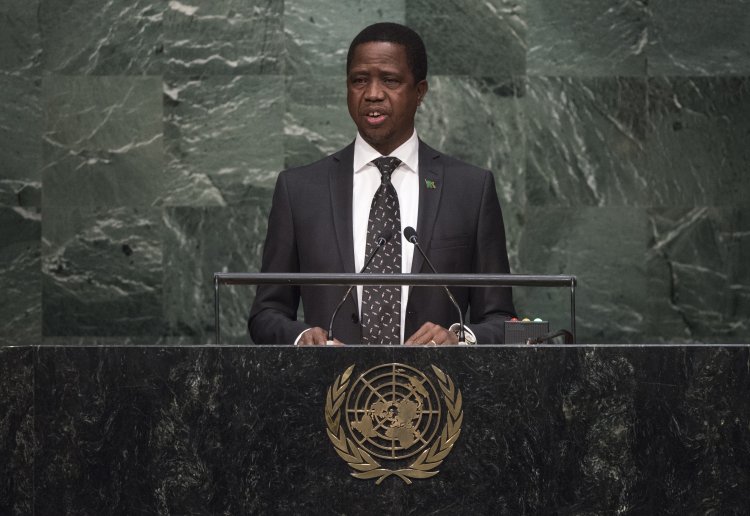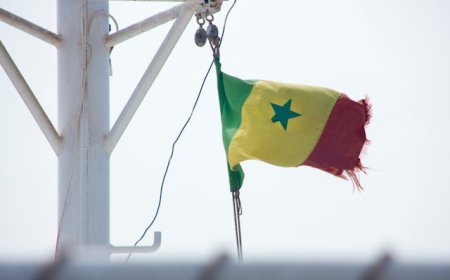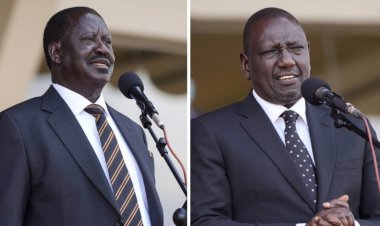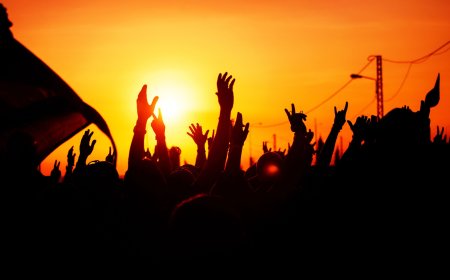Summary
- Economy and governance dominating campaigns and will occupy national discourse post-election.
- Decline in democratic space affecting opposition campaigns as state institutions tilt to the ruling party.
- New infrastructure is the ruling party’s main campaign pitch. The opposition is promising economic revival and better financial management.
- International election observers have been invited, but they are haunted by the ghosts of Kenya and Malawi.
- Major partners China, EU, US, UK are watching closely for what the outcome will mean for development cooperation.
The August 12 election is widely seen as a referendum on the governing Patriotic Front (PF) which has been in power since 2011. Aspirants will be contesting for 156 parliamentary and 1,858 council seats. Sixteen candidates are on the presidential ballot, the highest since the country reverted to multiparty politics 30 years ago. Although new entrants like the Socialist Party led by former newspaper editor, Fred M’membe, fancy their chances, in reality, it is a two-horse race between the incumbent Edgar Lungu of the PF and his main challenger Hakainde Hichilema who leads the United Party for National Development (UPND).
In the 2016 election, Lungu collected 50.35%, against Hichilema’s 47.63%, which he disputed, alleging rigging and went to court but did not succeed in having his case heard. This closeness is expected to repeat and promises a nail-biting contest between the two main rivals.
A lawyer, the 64-year-old Lungu rose through party ranks and became President in January 2015, succeeding Michael Sata who died in office. Civil society tried to stop Lungu’s candidature because he had served two terms and was therefore ineligible. They contended that he had held office since 2015, when he completed Sata’s term and from 2016 to 2021. But the Constitutional Court ruled in Lungu’s favour, saying the period from 2015 to 2016 did not constitute a term. This judgment sparked debate and invited ridicule on the court’s interpretation of the law.
While some voters shudder at the prospect of another five years of PF, Lungu believes he has delivered and is confident of re-election. “We have invested heavily in infrastructure development which has seen the transformation of our country through roads, bridges, schools, universities, hospitals, among others,” he said when he launched his manifesto in April.
Hichilema is a 59-year-old economist and wealthy businessman who is running on an agenda of fixing the economy. He promises to renegotiate and restructure the country’s foreign debt, cut waste and redirect resources to productive sectors of the economy. He, too, believes his time is now. “This election will produce a change of government because the people have decided. Change is written everywhere,” he said in July in a discussion with civil society and academicians.
A win for Lungu will mean at least five things: First, a huge relief for his party, which has been harshly criticized for the poor state of the economy. Second, it would give Lungu the chance to make bold (even unpopular) decisions on the economy, which he held back for electioneering purposes. In so doing, it would also mean Lungu immediately getting the economy back on track as he cannot — for another five years — defend his current economic performance nor ignore the public pressure and discontent that comes with economic hardship. Third, it would leave the country discussing the irony of re-electing a party accused of crashing the economy. Fourth, it may also mark the beginning of the end for the PF, if past record is anything to go by. Unlike in Malawi and Ghana where former ruling parties bounced back to power, two of Zambia’s former ruling parties have struggled to hold together after losing power as wrangles, despondency and disintegration set in. Finally, Lungu has been criticized for undermining state institutions that are supposed to keep him in check. So, a win for his party spells doom for democracy, human rights, and the rule of law in the eyes of those who desperately want him out.
Victory for Hichilema will be monumental. First, it will end his 15-year pursuit of the country’s top job. Second, it will be an enormous respite for his loyal supporters who have in the last ten years endured state harassment and the disappointment of previously coming so close to victory only to miss it by a whisker. Third, having promised an “economic turnaround” and sold himself as an ‘economic manager’, Hichilema will be under pressure to deliver on the economy. Fourth, in the broader context, his victory will be viewed as a punishment of the PF for its economic record and a reminder to the UPND that failure to fix the economy invites public wrath. Fifth, given his experience in the opposition where he has been arrested several times “on flimsy grounds,” as he says, winning power will be a test of whether he can fulfil his promise of not using state institutions to harass opponents and exact revenge. Finally, there is a possibility of some former government officials being prosecuted for scandals that Lungu’s administration swept under the carpet using the power of incumbency.
Managing the election
The political space is tight for the opposition, while the ruling party enjoys the benefits of power. Two institutions in the spotlight are the Electoral Commission and the police, both of which do not inspire much public confidence and stand accused of bias to the ruling party. Citing COVID-19, the Electoral Commission banned campaign rallies. But the opposition have complained that the pandemic has been “weaponized” against them as the ruling party are ignoring the ban, while security agencies come down hard on them. The law on public gatherings only requires convenors to notify the police seven days before, but the police have denied the opposition the right to assemble on several occasions.
The voters’ roll is another source of controversy. Last November, the Electoral Commission targeted to register 9 million voters but managed a little over 7 million across the ten provinces. The voters’ roll has more voters in PF than opposition strongholds. Some civil society organizations and the opposition believe this was deliberately done to advantage the PF. Regarding freedom of movement, aviation authorities (not for the first time) recently blocked opposition leaders from flying north of the country because PF officials were in the same town of their destination. As for access to the public media, it took the High Court to order the state broadcaster to air opposition adverts.
Key issues
There are two key issues in the election: the economy and governance.
For the first time since 1998, the economy slid into recession in 2020. Authorities blame COVID-19, but critics argue the economy was already in the doldrums before the pandemic arrived. Depreciation of the local currency has sent the cost of living skyrocketing as both businesses and consumers grapple with the effects. This has left the PF with little defence in the face of much criticism, save to compare the country’s cost of living to neighbouring countries where they say it is higher. In its mid-year Monetary Policy Statement, the Central Bank said its focus is on “containing escalating inflationary pressures”. In 2011, Zambia’s foreign debt was around USD 3 billion (EUR 2.5 billion) but is now officially USD 12.74 billion (EUR 10.7 billion). This figure is contested by some economists who suspect it is much higher, especially that loans from China remain opaque. In his research on Zambia’s Growing China Debt Crisis, economist Trevor Simumba said, “There is a severe lack of transparency over many key terms, including repayment, contracting obligations, project feasibility, value for money and loan security. This lack of transparency makes it impossible to have a clear account of the implications of this borrowing for the public finances.”
The government is struggling to service its debt. In November 2020, Zambia missed a payment of USD 42.5 million (EUR 40 million) on its USD 750 million (EUR 634 million) Eurobond and became the first country in the COVID-19 era to default on its Eurobonds. Since 2012, Zambia has issued three Eurobonds totalling USD 3 billion. The first Eurobond matures in September 2022, but payment of interest is already putting a tight squeeze on the country’s finances. Debt servicing is depriving the provision of important public services such as education and health, the latter of which has come under the spotlight because of the COVID-19 pandemic. The African Development Bank, a key multilateral lender, attributes the current debt situation to “the government’s pursuit of expansionary fiscal policy for public investments, despite falling revenues.” The Bank projects that Zambia’s economy will grow by only 1% in 2021 and 2% in 2022.
Second are governance, human rights and the rule of law issues. The government is under public pressure for how it handled a spate of corruption scandals. The most recent being the importation and distribution of expired drugs and defective health kits worth USD 17 million (EUR 14.3 million). The Minister of Health was only dismissed after an oversight committee of Parliament shined some light on the deal. According to Transparency International, “Zambia is a significant decliner on the 2020 Corruption Perception Index, dropping five-point since 2013.” Various reports from the Auditor General show a waste of public funds.
In June, Amnesty International released a hard-hitting report that indicted Lusaka’s human rights record. “What we have seen in Zambia, especially in the past five years, is an increasingly brutal crackdown on human rights, characterized by brazen attacks on any form of dissent,” said Deprose Muchena, Amnesty’s Director for East and Southern Africa. “Opposition leaders, journalists, media houses and activists have all been targeted, and speaking out against allegations of government corruption or abuse has become more dangerous.” But the government rejected Amnesty’s report and did not respond to the report’s specific documented cases of human rights violations. Instead, it accused Amnesty of “causing panic when they anticipate that the outcome of the impending general election will not suit their preferred political parties.”
Geopolitical interests
Given its historical role in advancing peace in the region and its internal peace even amid its deeply polarizing politics, what happens in Zambia is of concern to the rest of Southern Africa. As such, the election is being closely watched within the region and beyond.
China, a key lender accounting for 28% of Zambia’s foreign debt, is watching even though, unlike its western counterparts, it does not interfere in the internal politics of its partners. As of October 2017, over 600 Chinese firms with an investment nearing USD 4 billion (EUR 3.3 billion) were operating in Zambia, making it one of the top ten destinations in Africa for Chinese investment.
Other major donors to Zambia like the EU, US, UK, Japan, and Canada are also watching keenly, especially given their explicit focus on good governance, human rights and the rule of law. In a joint statement, they called for “an electoral process that is free, fair, and absent of violence.” By saying “all parties and candidates should be afforded equal rights and protections”, they were implicitly speaking to some state institutions that civil society and opposition had accused of favouring the incumbent party, thus creating an uneven electoral playing field.
The United Nations, which typically does not monitor elections, has also taken an interest. The UN Secretary General’s Special Representative to the African Union, Hanna Tetteh, was in Lusaka in May/June and met the government, opposition parties, civil society, and media representatives. In a statement at the end of her visit, she said among the key issues raised in her meetings was that “It is important for key institutions with an electoral mandate to undertake their respective functions in a manner that inspires public and stakeholder confidence.”
In April, Lungu invited international election observers for the August election. Major observers in the past have included the African Union, the Southern African Development Community (SADC) Parliamentary Forum, Common Market for Eastern and Southern Africa (COMESA), Electoral Institute for Sustainable Democracy in Africa (EISA), International Conference on the Great Lakes Region (ICGLR), European Union, Commonwealth and the Carter Centre. Previously, observers have hastily declared Zambian elections as “free and fair” merely based on the voting-day processes, overlooking the fact that elections are a process with various stages. Local observers are thought to do a better job as they are in-country and understand the legal and administrative procedures and dynamics of running the election. In its report on election observers, the Institute for Security Studies says, “poor conclusions by international election observer missions frustrates people’s desire for free, fair and transparent elections.”
Given the recent experiences of Kenya and Malawi, where, in both cases the Supreme Court overturned elections that observers had declared “free and fair”, it is expected that going forward, observers will take into account the entire electoral process, not just the voting day events. Thus, be more measured and thorough in their assessments.
Reginald Ntomba is a Zambian journalist, author and political scientist based in Lusaka. His writings on Zambia’s politics, history and economy have appeared in various local and international publications. He is the author of The Mwanawasa Years, a biography of Zambia’s third president Levy Mwanawasa, and the forthcoming Michael Sata: Portrait of a Populist, focusing on the fifth and immediate past president.




